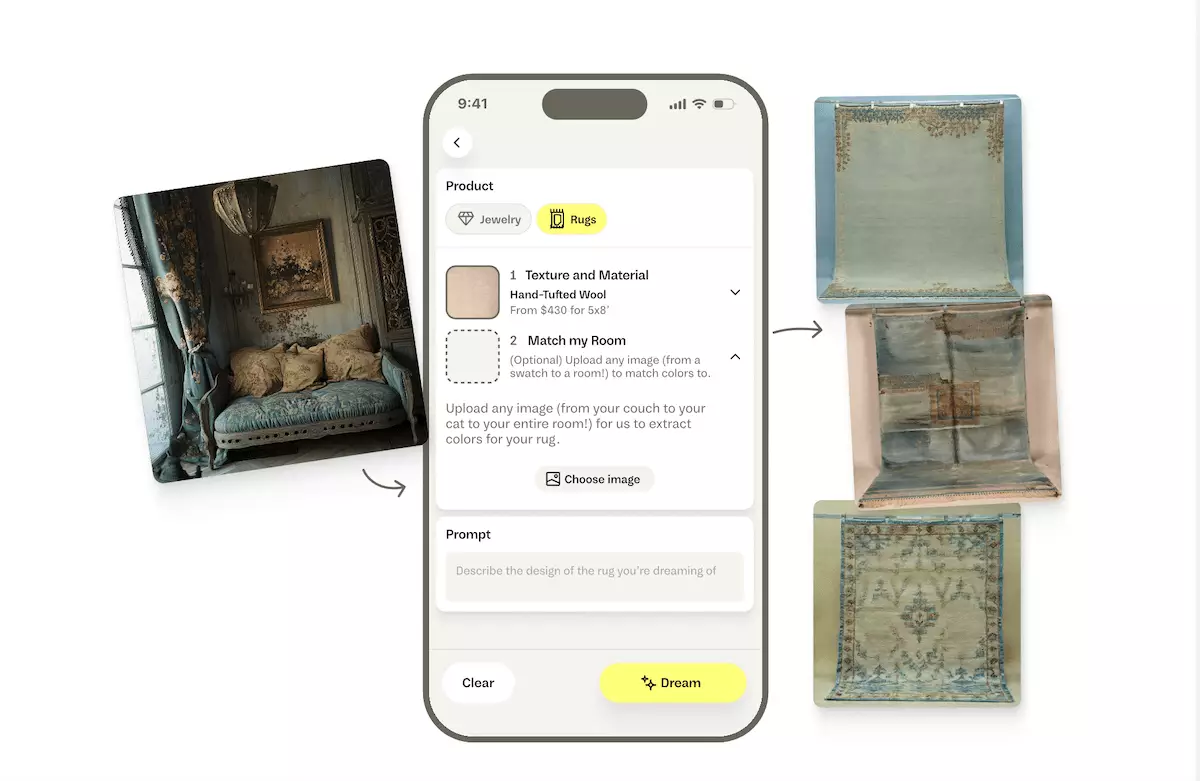In a brilliant fusion of technology and creative expression, Arcade is dramatically widening its horizons by entering the home goods sector, starting with a unique offering—custom-designed rugs. This move not only signifies an evolution in their product lineup but also paves the way for redefining how consumers engage with home décor. Existing primarily as a generative AI marketplace, Arcade has previously made a mark in jewelry design, where individuals could create personalized pieces using cutting-edge AI tools. With their recent announcement, they showcase a keen understanding of consumer demands, allowing users to elevate their living spaces with tailored rugs that reflect personal taste.
A Stylish Addition: Rugs Designed with AI Insight
On a recent Monday, Arcade unveiled its innovative “Match My Room” feature, which enhances the shopping experience by enabling users to upload photos of their rooms. This feature intuitively analyzes the existing color palette, facilitating the design process of rugs that seamlessly blend with their surroundings. Although the feature currently falls short in replicating intricate patterns from other decor pieces, it shines in helping users curate a cohesive aesthetic. The prospect of designing unique, visually captivating rugs through simple text prompts—coupled with the promise of affordability—is particularly appealing in a market often dominated by exorbitant luxury prices.
With rugs starting at $400 for standard options, these designs provide a competitive alternative to traditional luxury retailers whose prices often climb into the thousands. By utilizing state-of-the-art generative AI technologies such as Midjourney and Stable Diffusion, Arcade is not only democratizing access to high-quality home goods but is also challenging the status quo of artisanal craftsmanship.
Empowering Users Through Creative Engagement
Arcade has ingeniously recognized that the pursuit of creativity should not be constrained by practicality or costs. Their “Dream Boards” feature further enhances user engagement, allowing individuals to create collections akin to Pinterest boards, centered around curated themes, including trendy jewelry and now, stylish rugs. This platform extension not only stimulates creativity but encourages social sharing and interaction within the community, potentially boosting sales as users discover and purchase from shared boards.
Additionally, the platform’s affiliate program and enhanced seller commissions underscore Arcade’s intent to forge partnerships with passionate creators and influencers. With a focus on building a community of entrepreneurs, Arcade’s approach invites collaboration and incentivizes individuals to share their unique designs, leading to an expansion of their product offerings. This collaborative structure forms an ecosystem of creators, fostering a sense of ownership and pride among participants, which can only bolster customer loyalty.
Strategic Investments and Future Horizons
Arcade’s recent Series A funding round, which raised $25 million and pushed their total funds to $42 million, places them in an enviable position for growth. The capital will drive significant investments in platform development and the hiring of key talents, which are pivotal in scaling operations efficiently. Having already attracted the attention of high-profile investors like Ashton Kutcher and Reid Hoffman, the company stands poised to grow its offerings beyond rugs, with ambitions to venture into ceramics and apparel in the near future.
The leadership of Mariam Naficy, a prominent female entrepreneur with a track record of successful retail ventures, demonstrates a strong vision that is crucial for navigating the complexities of market expansion. Her experience with Minted and Eve equips the platform with insights needed for marrying technology with traditional craftsmanship, thus appealing to a demographic that values both innovation and authenticity.
The future is bright for Arcade, as trends increasingly lean toward personalized and sustainable design solutions. By intertwining generative AI with daily living essentials, they reclaim the narrative from fast fashion and disposable goods, aiming for a world where individual creativity is celebrated and accessible. In championing a blend of cutting-edge technology and artisanal care, Arcade not only positions itself as a formidable market player but as a catalyst for a transformative wave in the home goods industry. As they continue to evolve, their impact on how consumers perceive and procure personalized design items will undoubtedly be profound and lasting.

